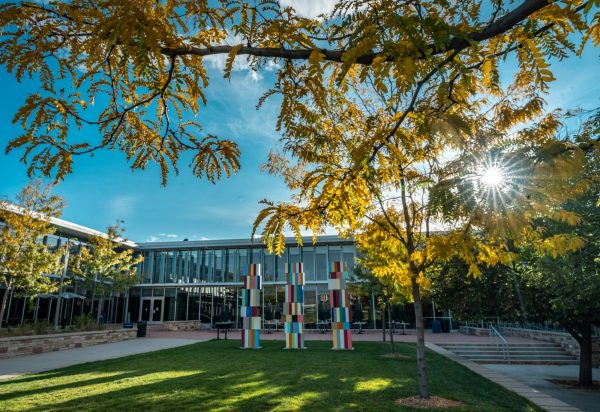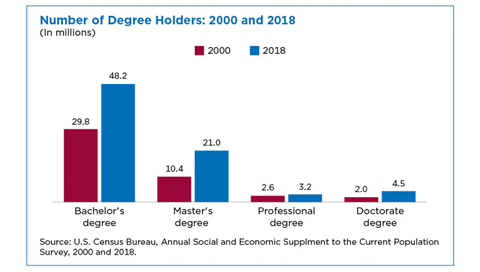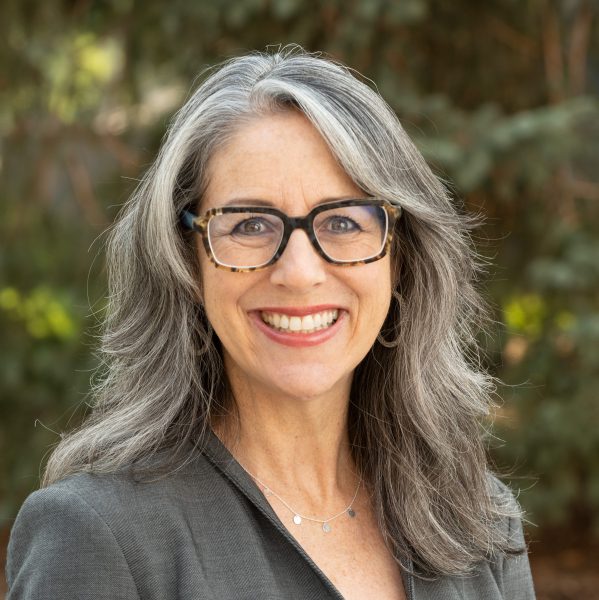
According to the U.S. Census Bureau, the number of degree holders in the US with a master’s degree is 21 million and the number with a PhD has grown to 4.5 million (with bachelor’s degrees at 48 million).

And Colorado State University provides many opportunities for those graduate students.
According to CSU’s Graduate School website, CSU has more than 6,500 resident and distance graduate students. Graduate students at CSU come from 90 different countries and are enrolled in more than 100 doctorate, master’s, and professional degree programs. Each year, CSU awards 1,600 master’s degrees, 220 doctoral degrees, and 140 doctor of veterinary medicine degrees.
Within the College of Liberal Arts, we offer:
- 2 MFA degrees (with 7 concentrations)
- 3 professional degrees
- 7 doctoral degrees
- 13 master’s degrees (with 14 concentrations)
The College of Liberal Arts currently has 727 graduate students in 39 residential and online programs who make a significant contribution to the educational mission of the university. Graduate students provide teaching, research, creative artistry, and other support to our undergraduate students and to our faculty.

"Graduate students are the thinkers, makers, leaders, and doers of tomorrow. When we teach and conduct research with graduate students, their creativity and new perspective makes all of our programs and faculty better."
– Roze Hentschell, Associate Dean for Academic Programs
From leading a classroom as a Graduate Teaching Assistant or Graduate Teaching Instructor, to conducting research as a Graduate Research Assistant, our graduate students are often able to apply the latest teaching pedagogy they are observing from their own professors into their own classrooms, using current and engaging teaching methodologies for undergraduate students. In the Department of Sociology, GTIs performed a critical role in the pivot from in-person to online instruction needed in the spring and fall of 2020. In both the Departments of English and Communication Studies, GTAs undergo a rigorous training period over the summer, coupled with support throughout their first semester, to ensure that they not only gain experience to benefit their own teaching career but are also providing the best in teaching to undergraduates taking composition and public speaking.
"Graduate students are instrumental to the teaching mission of the university and college. Undergraduate students have access to some of the brightest minds and dedicated individuals at the university."
– Roze Hentschell, Associate Dean for Academic Programs
Through the hands-on interaction that graduate students have with faculty members, they can grow their experience and their portfolio to take them into careers in or out of academia. Whether that’s acting as research fellow for a scholarly journal, researching vaccine hesitancy among certain populations, or conducting a language needs analysis of veterinary communications, our graduate students are pursuing, and sometimes discovering, the ways in which they want to create a meaningful career and life.
"In addition to gaining advanced academic credentials to better position a student for the workplace of the future and for careers in academia, graduate students participate in the enterprise of creating new knowledge rather than only understanding existing knowledge.
Through coursework, faculty mentorship, teaching opportunities, and professional development programs, graduate students are able to deepen their knowledge of a specific academic discipline and gain skills that will serve them in whatever path they choose after graduation."
– Roze Hentschell, Associate Dean for Academic Programs
Thinkers, Makers, and Leaders of Tomorrow
Read the stories about our graduate students and graduate student alumni who are making an impact in the classroom, in the field, in their research, and in their careers.
